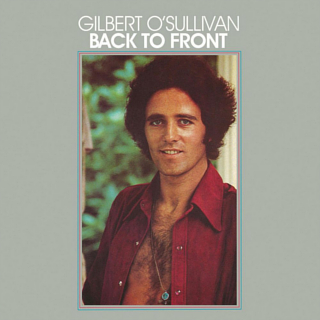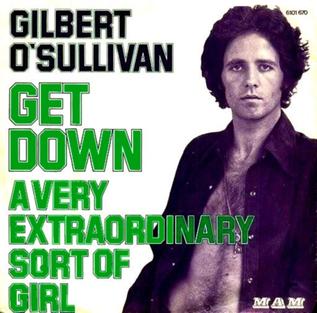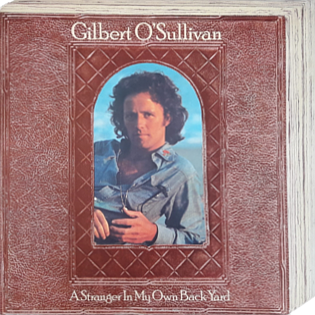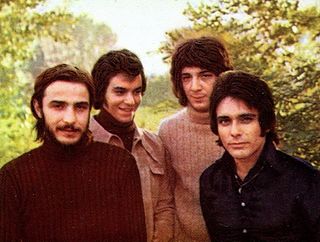
You Are the Quarry is the seventh solo studio album by English singer-songwriter Morrissey. It was released on 17 May 2004 by record label Attack, and was his first album in seven years following 1997's Maladjusted. The album was a huge comeback for Morrissey; all four of its singles reached the top 10 on the UK Singles Chart, and the album itself reached number 2. The album also reached number 11 on the Billboard 200, making it Morrissey's highest-charting album in the United States.

"Nothing Else Matters" is a power ballad by American heavy metal band Metallica. It was released in 1992 as the third single from their self-titled fifth studio album, Metallica. The song peaked at number 11 on the Billboard Mainstream Rock Tracks chart, number 6 on the UK Singles Chart, number 1 in Denmark, and reached the top ten on many other European charts. Recognized as one of Metallica's best known and most popular songs, it has become a staple in live performances.

Raymond Edward "Gilbert" O'Sullivan is an Irish singer-songwriter who achieved his most significant success during the early 1970s with hits including "Alone Again (Naturally)", "Clair" and "Get Down". His songs are often marked by his distinctive, percussive piano playing style and observational lyrics using word play.
MAM Records was a British record label launched in 1970 by the management company Management Agency & Music Ltd. (MAM). It was founded by Gordon Mills and Tom Jones and distributed by Decca Records. The first single released on MAM was "I Hear You Knocking" by Dave Edmunds in 1970. Later that year, Gilbert O'Sullivan started his run of hit singles on MAM with "Nothing Rhymed", and he also provided MAM with its first hit album in 1971 with Himself. Other hit albums such as Back to Front, I'm a Writer, Not a Fighter, and A Stranger In My Own Back Yard followed.

Gordon William Mills was a successful London-based music industry manager and songwriter. He was born in Madras, British India and grew up in Trealaw in the Rhondda Valley, South Wales. During the 1960s and 1970s, he managed the careers of three highly successful musical artists - Tom Jones, Engelbert Humperdinck and Gilbert O'Sullivan. Mills was also a songwriter, penning hits for Cliff Richard, Johnny Kidd & the Pirates, Freddie and the Dreamers, The Applejacks, Paul Jones, Peter and Gordon and Tom Jones, most notably co-writing Jones's signature song "It's Not Unusual" with Les Reed.

"Nathan Jones" is a song by American girl group the Supremes from their twenty-third studio album, Touch (1971). It was released on April 15, 1971, as the album's lead single. Produced by Frank Wilson and written by Kathy Wakefield and Leonard Caston, "Nathan Jones" was one of eight top-40 entries the Supremes recorded after its original frontwoman, Diana Ross, left the group for a solo career.

"Clair" is a song by Gilbert O'Sullivan, released in 1972 as the first single from his second album Back to Front. It was written by O'Sullivan and produced by Gordon Mills, and is one of O'Sullivan's biggest-selling singles.

"Alone Again (Naturally)" is a song by Irish singer-songwriter Gilbert O'Sullivan. Recorded in 1971, it became a worldwide hit. The song did not originally appear on his 1972 studio album Back to Front, but has been included in reissues (often replacing "Clair").
"Please Please Please Let Me Get What I Want" is a song by the English rock band the Smiths. It was released on the B-side of the single "William, It Was Really Nothing" in 1984 and later featured on the compilation albums Hatful of Hollow and Louder Than Bombs. It has been covered by several other artists. The song was also included on the soundtrack album of the 1986 film Pretty in Pink and featured in the film Never Been Kissed. An instrumental cut of the cover from The Dream Academy was featured in Ferris Bueller's Day Off during the art museum sequence when Cameron is viewing the pointilist painting "A Sunday Afternoon on the Island of La Grande Jatte".
"I (Who Have Nothing)" (sometimes billed as "I Who Have Nothing") is an English language cover of the Italian song "Uno dei Tanti" (English: "One of Many"), with music by Carlo Donida and lyrics by Giulio "Mogol" Rapetti. The initial version, "Uno dei Tanti", was performed by Joe Sentieri in 1961. The song first recorded in English by Ben E. King in 1963 with new lyrics by Jerry Leiber and Mike Stoller.

Back to Front is the second studio album by Irish singer-songwriter Gilbert O'Sullivan, released in October 1972 by MAM Records. The album follows the success of his 1971 debut album Himself and singles such as "Alone Again (Naturally)". Coinciding with the album, O'Sullivan abandoned his distinctive dress sense, which included a short cap and trousers, and instead presented himself as a more masculine, hairy-chested singer with a perm, wearing sweaters with the letter "G" emblazoned on them, which helped establish him as a sex symbol. O'Sullivan wrote the album's songs at home during night-time writing sessions, and recorded the album with his manager and producer Gordon Mills in London.

"Get Down" is a song by Irish singer-songwriter Gilbert O'Sullivan, from his 1973 album I'm a Writer, Not a Fighter. Released as a single, it spent two weeks at the top of the UK Singles Chart in April 1973, was also a number-one hit in Ireland for three weeks and was a top-ten hit in the United States and Canada. The song was originally used by O'Sullivan as a piano warm-up tune, but was eventually extended into a full song and released as a single; O'Sullivan recorded and released the song as a change from his more melancholy pieces. It became a Gold disc.

"You'll Be Gone" is a song recorded by Elvis Presley and published by Elvis Presley Music and released in 1965 on the Girl Happy soundtrack album and as a 45 single. The song was recorded in 1962 and was one of very few which Presley was involved in writing; his co-writers were his bodyguard Red West and Charlie Hodge. The other song that Elvis Presley composed was "That's Someone You Never Forget" in 1961 with Red West, which was on the Pot Luck LP released in 1962. The song was recorded on Sunday, March 18, 1962, at RCA Studio B in Nashville, Tennessee.
"I'll Never Fall in Love Again" is a song written by Lonnie Donegan and Jimmy Currie, and first released by Donegan as a single in 1962.

Himself is the debut album by Irish singer-songwriter Gilbert O'Sullivan, released in the United Kingdom by MAM Records in August 1971, following the top 10 success of its single "Nothing Rhymed". O'Sullivan originally intended the album to feature only his voice and piano playing, until his manager and the album's producer Gordon Mills persuaded him to use full instrumentation and arrangements by Johnnie Spence. Mills also aided O'Sullivan with his songwriting, which incorporates an observational style and word play, the usage of the latter being influenced by Spike Milligan.

A Stranger in My Own Back Yard is the fourth studio album by Irish singer-songwriter Gilbert O'Sullivan, originally released in October 1974 by MAM Records. Peaking at number 9 on the UK Albums Chart, it was O'Sullivan's fourth and, to date, final top ten album, although it received positive reviews from critics. After the funk-inflected I'm a Writer, Not a Fighter, A Stranger in My Own Back Yard marked a return to the style of O'Sullivan's first two albums. The album's only single, "A Woman's Place", was O'Sullivan's first since his breakthrough to miss the top 40 of the UK Singles Chart. Union Square Music reissued the album on the Salvo label in 2012 as part of the Gilbert O'Sullivan - A Singer & His Songs collection.

Nothing but Thieves are an English rock band, formed in 2012 in Southend-on-Sea, Essex consisting of lead vocalist and guitarist Conor Mason, guitarist Joe Langridge-Brown, guitarist and keyboardist Dominic Craik, bassist Philip Blake, and drummer James Price. In 2014, they signed to RCA Records and a year later in October 2015, they released their self-titled debut album. Their second album, Broken Machine was released in September 2017, receiving wide acclaim in addition to peaking at No. 2 in the UK Album Charts. They released an EP titled What Did You Think When You Made Me This Way? in October 2018, followed by their third studio album, Moral Panic, in October 2020. This was followed in July 2021 by the album's "second part" with the EP entitled Moral Panic II. In June 2023, they released their fourth studio album, Dead Club City, which became their first UK No. 1 album.

I Profeti were an Italian pop group, mainly successful in the late sixties and in the seventies.

"We Will" is a song by British-Irish singer-songwriter Gilbert O'Sullivan, released as a single in July 1971. The ballad was O'Sullivan's second top 20 hit, peaking at number 16 on the UK Singles Chart on 4 September 1971. It was included as a bonus track on the 2011 reissue of his debut album Himself.

California Son is the twelfth solo studio album by English singer Morrissey. Released on 24 May 2019 on the singer's label étienne and licensed on BMG, the album is a collection of cover versions. The single "Wedding Bell Blues", initially written and sung by Laura Nyro in 1966, featured Billie Joe Armstrong of Green Day on backing vocals.
















